on being an ethical vegan for 33 years
- Written by John Kinsella, Professor of Literature and Environment, Curtin University
I live in a vegan family situation. I have been a vegan for over 33 years and my partner, poet and novelist Tracy Ryan, has been a vegan for over a quarter of a century; our 16-year-old son Tim was conceived and born a vegan, and remains one.
If you ever doubt it’s his choice, ask him — he’s eloquent on his veganism, and has angles on it we don’t, neither Tracy nor I having been born vegans. Tracy has always had a deep interest in nutrition, and raising children vegan has been a deeply informed life-act — done with respect for their rights as well as animal rights. We don’t use animal products in any way we are aware of. Rather than seeing our food, clothes, shoes, working materials, as animal-product “alternatives”, they are our norms.
Over the decades we have seen and heard it all when it comes to the arguments and attacks on veganism. Really, people find their own way through such things as they do if they hold any committed ethical position that is about principle and not style.
One of the first that vegans encounter is the specious argument about denying children before a certain age a choice in the matter, that veganism is forced on them.
It’s such an obvious reply: Aren’t you forcing your carnivorism (or more accurately, omnivorism) on your children? They are also not given a choice — people make decisions for their children before they are empowered (informed enough) to make decisions for themselves. It is possible to have a balanced vegan diet, and even back in the mid-80s, vegan sources of B12 and other more complex nutritional requirements were available.
But the point of this article is not for the fors and againsts, because these are well attested, and even the most slipshod research skills will reveal what is and isn’t the case. Rather, this is an account of long-term veganism in the context of the recent increase (last five or so years) in vegan consciousness, and availability of vegan foods.
Actually, vegan food has always been available, of course, just in raw and rudimentary and unrefined ways — what we are talking about in the “now” is the mass replacement of mass slaughterhouse products with non-slaughterhouse products that “equate” and move from being “faux” meat (protein), or ersatz, to food definitions and realities in their own terms. That’s what has industry scared and reactive.
Personally, I have a problem with all industrialisations and capital processes of market — the fetishisation of products that increase wealth rather than answer needs — but it is this “mass” that so upsets animal-exploitation, agri-industrialism. Little of it is cultural, outside profit-making. Arguments about what’s best for the planet are placed far down the list of priorities, as the fossil-fuel desire shows.
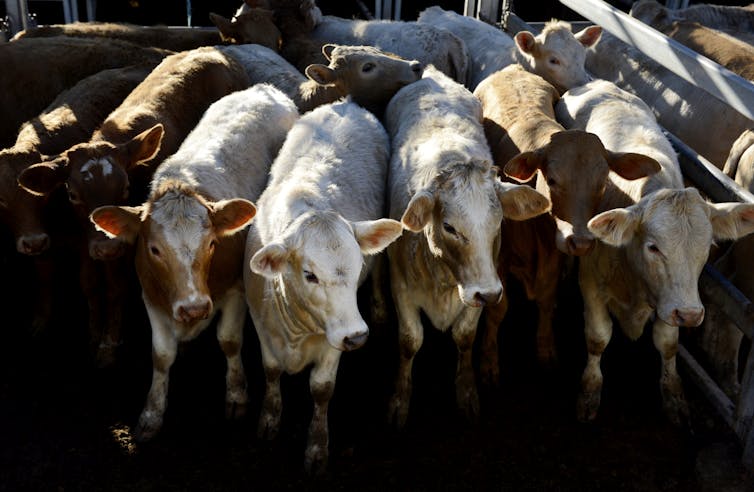 Cattle awaiting auction in Brisbane in 2013.
Dan Peled/AAP
Cattle awaiting auction in Brisbane in 2013.
Dan Peled/AAP
Casting aside the gun
There are exceptions, and cultural beliefs that do need to be respected. When I began being a vegan, I was outwardly proselytising; now I am only so in my writing and via how I live. I have learnt that respecting others’ journeys is the only way that long-term change comes.
That’s an argument for all ethical issues, and it could be argued that all killing must be stopped immediately or we simply appease our own consciences at the expense of being concerned about our own behaviours — many mass murders have taken place as people let their nation’s military go about its business outside their personal scrutiny, as that scrutiny is confronting to undertake.
Ethical positions are not “cults”; cults are the control of others to remove their capacity for personal choice – but it is a paradox to see veganism called a cult by meat-eaters who have been part of an industrial slaughter-cult all their lives.
Ironically, I come from a background of fishing and hunting (and became a vegan while living in a house on a dairy farm: witnessing). I was obsessed with guns when I was a child and a teenager — I wanted to become an army officer. My turning away from these values was conscious and specific — by my late teens and early 20s, I was a committed vegan, anarchist, and pacifist. I found my way there via the paradox of loving animals (I always have) and exploiting them (to my mind).
My poetry was tracking my concern, so my poetry helped in the decision-making — that old argument of poetic language expressing the inexpressible. When I wrote of casting aside the gun, of leaving animals be, it was because I had – but also to articulate and mark it. To give a sign in word as well as thought and action. A constant reminder of how and why I’d got to that point of change.
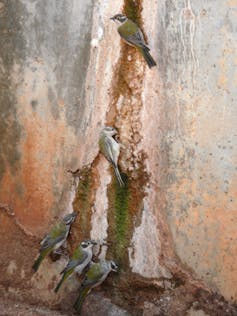 Honeyeaters finding sanctuary on the Great Tank at at Jam Tree Gully.
John Kinsella
Honeyeaters finding sanctuary on the Great Tank at at Jam Tree Gully.
John Kinsella
This was not easily the case — as an alcoholic in former days, I was aggressive, often in trouble, and confrontational. I got sober 24 years ago so I could better hold the values I believed in. It wasn’t an easy journey, but one in which I knew I had to reduce my own hypocrisies. And that’s it; that’s where a lot of misunderstanding manifests between vegans and non-vegans — it’s not a holier-than-thou situation, but a move towards being less impacting, less damaging, and more respectful of life.
I’ve actually known vegans quite violent (towards people), and I have rejected their positions because of this unresolved hypocrisy; but this has been rare.
And even in these cases, in time if they stayed vegan (they often didn’t), they moved away from their own anger and aggression and lived a life more in tune with their values. I say this because veganism is both an ethical position, and a position that eventually calls on a variety of consistencies with regard to how we treat people, who are, after all, animals too.
Nutmeat, palm oil and an ethics of commitment
A lot of older vegans will talk about the 80s as being a time of Nutmeat, avocados, and bananas, of boiling pulses to make protein patties to add to the steamed veggies, of reading labels carefully because there wasn’t the vegan certification process (or “market” for that to be insisted on) back then.
Sure, it is nice to be able to go out and eat more “cheffed” foods from supermarkets and in restaurants, but it’s not the be-all and end-all, and you still weigh up issues such as processing, origins and cultivation methods, and air-miles.
If we fall into dependence on mass food production processes, then ultimately we will damage animals in other ways. A classic example is that of palm oil — so essential to many processed vegan foods (as indeed non-vegan). The destruction of habitat to increase palm oil production eventually led to a call for palm oil that’s non-exploitative (of people and ecologies) — a regulation.
People survive the best way they can, and as with so many raw food materials, those containing palm oil are sourced in less wealthy zones to feed wealthier ones — capitalist exploitation works fast to adjust to new markets.
So any veganism not in tune with these issues quickly becomes an appeasement of one’s own conscience while hiding from the potential for damaging impacts. The response has to be holistic — vegan food producers need to work with non-vegans and different cultural realities to ensure transitions that don’t damage in other ways.
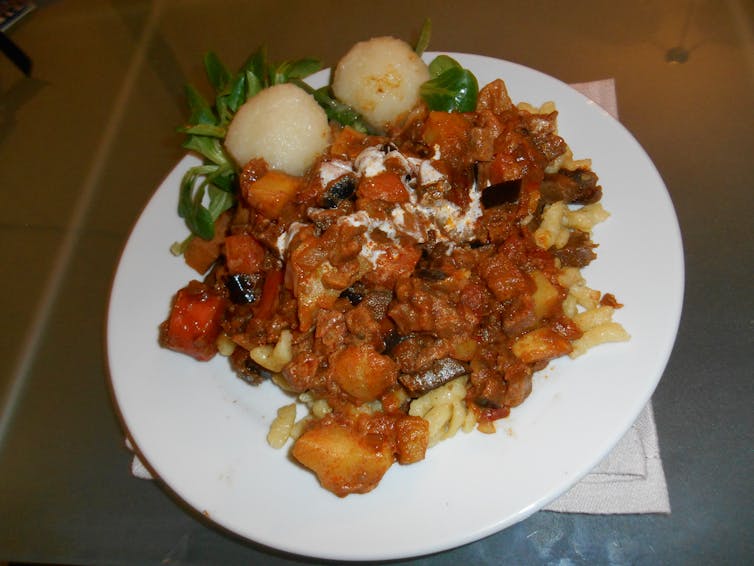 Tracy Ryan’s vegan goulash with dumplings.
Author provided
Tracy Ryan’s vegan goulash with dumplings.
Author provided
This is not wisdom from on high; it’s just decades of seeing faddism and change, of people calling themselves vegan when they don’t closely consider what’s in a “product”, or deploying the terms as a social definition while allowing themselves “exceptions to the rule”, or, say, eating honey (an animal product!).
Point is, “vegan” means something, and of course be whatever you are, but let’s let a term represent a value we can share and understand. Play with language by all means (that’s what writers do!), but not with the ethics of commitment.
Mobile phones, whose raw materials destroy whole communities and habitats in their extraction and manufacture, are an example of a contradiction with the new spreading of the message of veganism — we have to find a way to a common understanding of cause and effect. It’s a big and complex picture that tussles with the obvious fact that an animal hurt or killed is an animal hurt or killed.
Mutual respect
Veganism intersects with many cultural attitudes, and diverges from many others, across the globe, but mutual respect is, in my experience, an unassailable value.
I have never tried to force anyone to eat vegan, yet attempts have been made to shame me into not eating vegan, in order not to offend my hosts. I have never compromised my ethical position, but I have gone to great effort to explain my position and my desire not to offend a host.
That was early on — now I carefully have discussions before, say, sharing an eating space with those who have invited me about how and why I eat (and don’t eat) what I do. An intercultural conversation needs to be had. Confronting? Surely, in a pluralistic society we have these conversations to ensure respectful co-awareness all the time? If not, then we probably should. I have no problem in being forward about who and what I am — in fact, I see saying so as a sign of respect for my hosts.
The bottom line in all this, for me, for my family, is animal rights. We live among animals but keep none — they are part of the world around us and we wish to have no control over them.
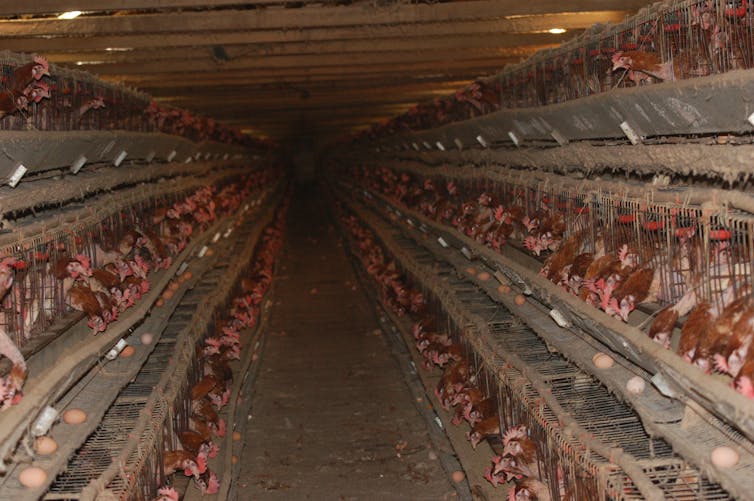 Hens photographed at a Tasmanian poultry farm in 2007.
Emma Hanswell
Hens photographed at a Tasmanian poultry farm in 2007.
Emma Hanswell
We deal with “pests” in non-invasive and non-damaging ways, and we work towards a consistency of respectful interaction. That’s to do with seeing no hierarchies of control, no speciesist superiority. Then you get the unthought-out attack-mode on saying such a thing (seriously): Are you saying if a lion was attacking your baby, you’d do nothing? Well, of course I would… What do you expect? Would I be cruel and seek to hurt and exploit the lion? No. Anyway!
Giving a minority report on UK TV
Living in the UK in the late 90s, we were invited to appear on the television program Susan Brooks’s Family Recipes. We went up to Manchester from Cambridge, and the chefs, Susan and her daughter, prepared us a vegan meal on set, and we sampled it and discussed what it was like being a vegan family. It was a fascinating experience because of the warm attitude to how we lived, coming from a “regular” cooking program.
Britain has long been more in tune with vegan living (the term comes from postwar UK), but in the 90s it was still very “minority”. If we were not part of the dissenting opinion, we were still giving a minority report. At the same time I spoke to the Vegan magazine about being a poet and a vegan, and how it informed my writing practice. There was a context. And it was broad in its conception — if you wanted medical research without vivisection or abuse of animals, you could support the Dr Hadwen Trust!
Such contexts are still being created in Australia — the aggressive response from some people to veganism accords with a macho public culture that seeks to manipulate markets to defend old colonial land usage and the machinery of animal pastoralism. In this, I am not commenting on individuals nor even communities, but on the machine of capitalism and its empowered defenders.
A stunning (I use no words carelessly, I think) example is the case of vegan activist James Warden who said he was was provided with no vegan food options while in a Perth prison — this is control, this is oppression, and this is the state protecting its ongoing colonial interests. There is a disconnect between traditional hunter-gatherer societies and the mass consumer, export-import underpinnings of colonial capital. It is the latter that concerns me because I have been part of it.
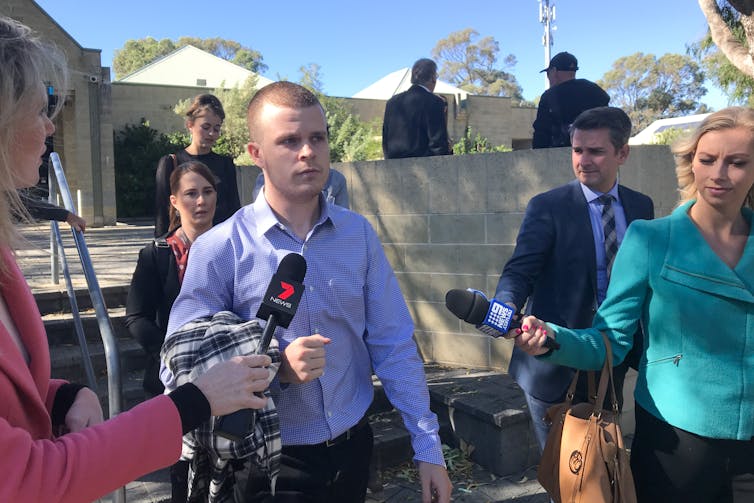 Vegan activist James Warden, accused of being the ringleader behind the theft of a calf and a dead piglet from WA farms, leaves the Mandurah Magistrates Court in Mandurah on May 3, 2019. Warden has pleaded not guilty to stealing.
Angie Raphael/AAP
Vegan activist James Warden, accused of being the ringleader behind the theft of a calf and a dead piglet from WA farms, leaves the Mandurah Magistrates Court in Mandurah on May 3, 2019. Warden has pleaded not guilty to stealing.
Angie Raphael/AAP
The New Veganism
There’s a new generation of vegan activists in Australia who have quickly been turned into public enemies — they are targeted by media, police, and government, and seen as interfering with what amounts to an ongoing sell of Australian values. As a poet, I’ve tried to speak through poetry in support of these activists, while also recognising that I come from a very different space through being older and longer-term in my activism.
I live in rural Australia, and co-exist with farmers and people who eat and use animals. Not in the house I share, and not on the Noongar land where I live, and which I acknowledge is not “mine”. But nearby. They know who we are and how we live, and we offer an alternative. Animals find refuge if they look for it. It’s their place, too.
The conversation is ongoing, persistent, and there’s no compromise in our position, but it’s also respectful of other people’s humanity, their free will, and their journeys. They are not us and we are not them. I will stand in front of a bulldozer to save bush, and I will live next to a bulldozer driver.
Each of us can only offer one another examples of alternatives. That’s how real change comes; that’s how fewer and fewer animals will suffer. But in this crisis mode of biospheric collapse, the reason there are more and more vegans is that the time has come to act. And people are acting. Others will too, because they see a need and want to, not because they are told to. Bullying happens in many directions at once.
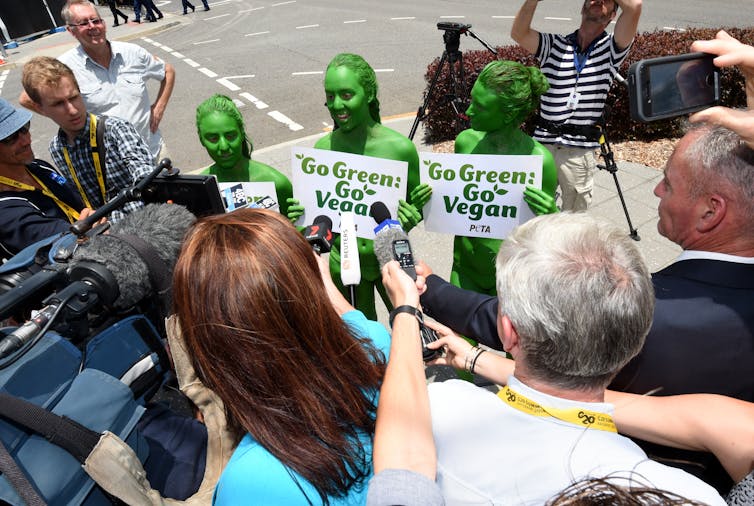 Animal rights activists from PETA wearing body paint speak to the media in Brisbane in 2014. They were calling on the G20 leaders to address the drain of the meat and dairy industries on the world’s resources.
Dan Peled/AAP
Animal rights activists from PETA wearing body paint speak to the media in Brisbane in 2014. They were calling on the G20 leaders to address the drain of the meat and dairy industries on the world’s resources.
Dan Peled/AAP
If I see a problem with the New Veganism it’s a possible connection with presentation and social monitoring. Social media try to direct, but also dilute the commitment of person to person, person to animal, person to real place where animals live.
Veganism doesn’t need “influencers” — though if anything stops animals being exploited, it’s a good thing. But as we — Tracy and I and Tim — see each animal as an individual with their own intact rights, as we see people, we also see the collective, the community, the herd, the hive, the loner, the gregarious… all these “types”… we also see the interconnected fate of the biosphere.
Technology that promotes veganism that consumes the planet is, for us, an irresolvable contradiction. A lot of thinking needs to be done around this — and modes of presentation and discussion need to be considered as well. The slaughterhouse is obvious and hidden; it is literal and a metaphor that can become real for all life in sudden ways.
Just a positive to finish with. I have crossed Australia many times (though not recently) by train, as I avoid flying here (to lessen eco-damage impact), and I have done so with much pre-prepared vegan food.
But the train caterers were always willing to make “bespoke” food for me, to supplement my food stash. The door to a broader veganism in “Western” societies has actually long been open — and if Western capitalism could learn from many non-capitalist, non-Western cultures, not only would they find much precedent sometimes on a very large scale, but also much communal goodwill around the choice of what we eat, and why we do or don’t eat it.
And to reiterate my support for the new generation of vegan activists looking to intervene in non-violent ways to stop the pastoral-factory exploitation of animals, I wrote this poem which appeared through PETA. I am not on social media, but they took it into that realm, the realm of style, influence, but also loss and consumer endgame if people are not wary.
I am here now
for the young vegan activists saving animals from slaughter
I am here nowbecause a young humaninterrupted my journey to the slaughtering,hoisted me over their shouldersand carried me towards animation.
I am here nowmy eyes dilating fastto take in this extensionto life — and the blood of my kinis a river never divided.
I am here nowbecause an interventiondrew out the length of my days;the things I have learnt we have taken —we breathe the same air as our dead.
I am here nowbecause the young humansare rising peacefully from their screensto step into the killing zones,to bend down and lift us back to the light.
Authors: John Kinsella, Professor of Literature and Environment, Curtin University
Read more http://theconversation.com/friday-essay-on-being-an-ethical-vegan-for-33-years-118049





